Bredonborough Loading into the car
08.55
Bredonborough.
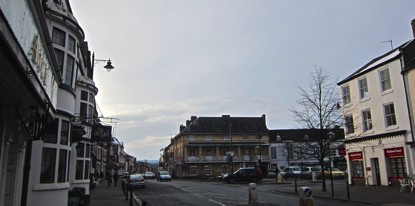
Loading into the car…
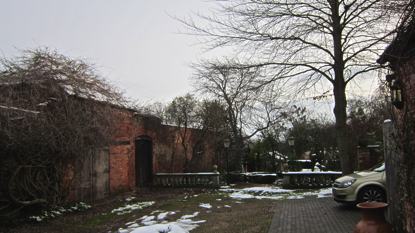
… and off to Breakspear Crematorium, near Ruislip.
19.44 Leaving c. 10.30 and arriving c. 12.30 I…
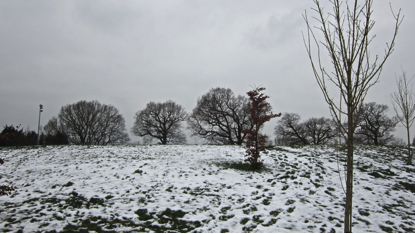
II...
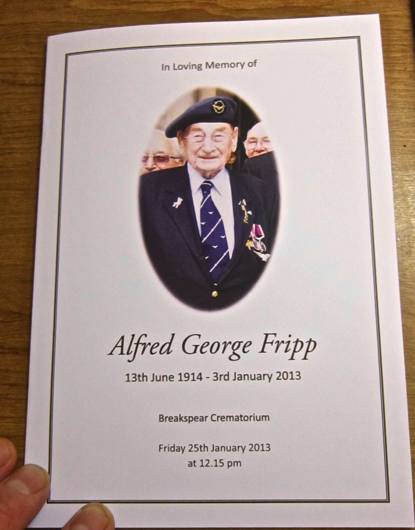
III...
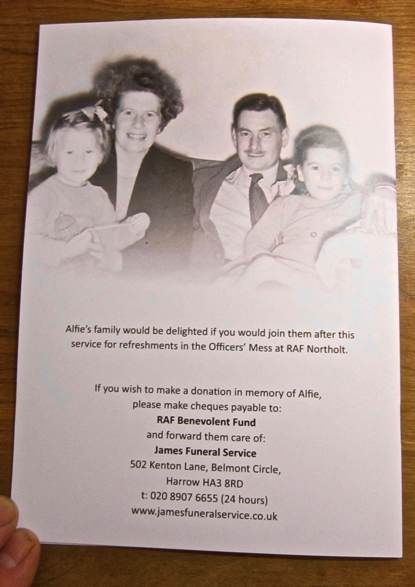
A very moving service, the chapel full of Uncle’s two families: the Fripps and the Royal Air Force. The 57th. Squadron provided pall-bearers and bugler.
A few words were presented, within a four-minute time limit, by myself, Sistery Paricia, two Grandsons of Daughter Sue, and Dr. Tuck, the RAF historian. My words…
Alfred George Fripp
Alfred George Fripp was a member of two families, and a repository of the history of both.
His second family was the Royal Air Force, which I believe he held in as much affection as his first.
Alfie was born into his first family on 13th. June 1939, the third of six children – Arthur, Betty, Alfred, Phyllis, Charles and Maureen – of Austin and Emily; in Gosport, where Austin was a Royal Marine stationed at the Eastney Barracks and a survivor of Gallipoli.
To his second family, he was known as Alfie. To his first family, as Bill. Uncle never knew why.
In 1930 Alfie joined the RAF.
On the 3rd. of September, 1939, he heard the declaration of war over the station tannoy.
Three days later, on 6th. September 1939, Alfie married Vera, which Uncle recently described to me as the best thing he ever did.
Alfie and Vera spent their wedding night in my Parents’ bed at 75, Leigh Road, Wimborne, Dorset.
On 30th September, Alfie was posted to France with the 57th. Squadron.
On 16th. October, he was shot down near Munster. Germany.
Alfie was repatriated to England in May 1945, and posted to Iraq six weeks later.
Twenty four years’ later, in 1969, after 39 years in the Royal Air Force, Alfie retired with the rank of Squadron Leader.
How to, very briefly, convey the essence of this man?
Simply, he never complained. I never heard my Uncle complain.
To put this positively: Alfie was always cheerful.
Two examples.
The first. On 7-7-2005, on his way to the annual Kreigie Reunion lunch, he was caught up in the bombings of Central London.
A BBC tv news team found him in a queue at a bus stop.
Alfie’s comment, broadcast on national television news: We’ve been here before! Nil desperandum!
This from a man who had been there before, and had not despaired.
The second. When I last visited Uncle at home on December 19th., and when I last spoke to him on Christmas Day, enquiring as to his condition, he answered on both occasions: Nothing that Death won’t cure!
There is no tragedy in a life well lived that runs its course.
Uncle’s life was long, and it was well-lived.
But, there is loss, and I miss my Uncle.
From Breakspear to the Wake. The Officers Mess, RAF Northolt was made available for this, a considerable honour for Uncle Bill’s civilian family to be allowed to hold his Farewell Celebration in an active service environment.
And it was a wonderful do: in the corner of the room, a slideshow playing with Alfie on film, speaking of his wartime experiences; and slides from Uncle’s life as a POW. Julian blew-up photos of his Grandfather, these prominently distributed around the mess. Various spoken contributions, tributes and memories of Alfie, efficiently organized by Sistery Patricia.
I presented a few words that fell outside the four-minute rule of the service. Much that I mentioned, or might have mentioned, can be found on this Diary with
a simple search.
Nor can I do justice to Uncle Bill in this entry.
Uncle refused outright to talk about his wartime adventures for fifty years, and only began to open up after 2001 when Sistery Patricia, a friend of Patricia who was a Vietnam vet, and myself visited Uncle at home. Servicemen can have conversations with servicemen that civilians cannot. In the past three-four years we have interviewed and filmed Uncle, scanned his photo and press archive. By reliving the story while told, the event itself continues to live in the experience of the storyteller and the audience. I’m not sure that the externalities of Uncle’s wartime life were “happy” but they forged enduring companionship. Uncle bore witness to significant events in which he participated, and helped to make.
It also became clear to me that, much as Uncle became willing to tell his stories, there was much that he did not. In addition to his wartime service, he was also a Cold Warrior. Much of that history remains unwritten, and may well never be.
Finally, I read this…
Alfred George Fripp
Return To Zagan.
Wednesday, 30th November 2011…, the site of Stalag Luft III. Uncle Bill’s presence on three days of filming was completely edited out of the tv show.
The programme documented the excavations to discover the tunnel used in The Great Escape. The siting was accurately deduced by a local woman working in the museum.
Uncle Bill was himself the first POW to step down and into the just-discovered entrance to the escape tunnel. Uncle showed me pictures of the moment, and it was moving. Some 66 years ago his pilot, Mike Casey, would have clambered in-and-along, escaped, been recaptured and shot on Hitler’s direct order.
And a first from Uncle Bill, who considers himself a sceptical, down-to-earth person, one not open to strange notions and obscure ideologies… As Uncle stepped into the entrance, he believed he heard voices from inside the tunnel, asking for it to be opened and for them to be given their freedom; freedom for the 76 souls continuing there.
I simply report Uncle’s comment.
The Minx and myself left this wonderful Celebration c. 15.30, arriving home before the forecast snowstorm c. 17.31.
A sense of moving on, in several ways.
A day.







